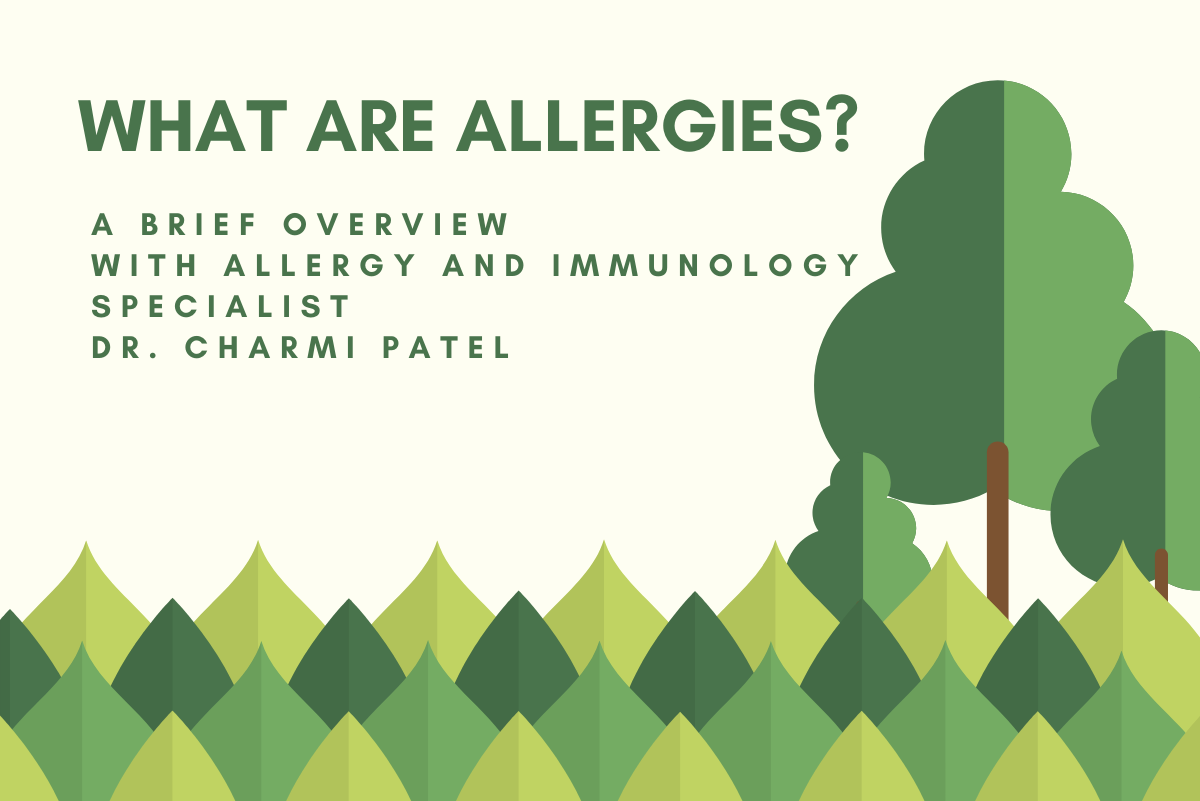What Are Allergies: A Brief Overview with Allergy and Immunology Specialist Dr. Charmi Patel
March 15, 2021
By: Dr. Charmi Patel
Categories: Allergies
With Georgia's most intense pollen season just around the corner, we wanted to talk about what allergies are and how they are manifested.
What are allergies, and how do they manifest?
With Northeast Georgia's most intense pollen season just around the corner, I wanted to take a moment to talk about a fundamental question: What are allergies, and how do they manifest?
Allergies are an exaggerated immune response to normal exposures in the environment. Physicians who specialize in allergies and immunology can accurately diagnose your environmental allergic triggers to formulate a personalized treatment plan for hay fever to improve quality of life.
Allergies can also manifest in terms of airway disease. Airway disease presents with frequent episodes of wheezing, coughing, shortness of breath and/or chest tightness, also known as asthma. Allergists/Immunologists not only assist in identifying triggers and management of allergic asthma, but also participate in care of patients with difficult-to-treat or severe asthma.
Seasonal allergic rhinitis (hay fever) affects more than 35 million Americans. If you suffer from it, you may experience sneezing, stuffiness, a runny nose, and itchiness in your nose, the roof of your mouth, throat, eyes or ears. These allergic reactions are most commonly caused by pollen and mold spores in the air, which start a chain reaction in your immune system.
What exactly is pollen and what are environmental avoidance measures that can be implemented for pollen allergies?
Pollen is tiny cells needed to fertilize plants. Pollen from plants with colorful flowers, like roses, usually does not cause allergies. These plants rely on insects to transport the pollen for fertilization. On the other hand, many plants have flowers that produce light, dry pollen that is easily spread by wind. These culprits cause allergy symptoms. Seasonal allergic rhinitis is often caused by tree pollen in the early spring. During the late spring and early summer, grasses often cause symptoms. Late summer and fall hay fever is caused by weeds.
Pollen Avoidance Tips
- Try to stay indoors when the pollen or mold levels are reported to be high.
- Check weather reports or websites for local pollen counts.
- Keep windows closed and use air conditioners if possible to prevent pollen from circulating indoors. Be sure to replace filters regularly.
- Shower at nighttime to ensure pollen is removed from your body and place worn clothes (covered with pollen) in laundry basket.
- Don’t mow lawns or rake leaves because it stirs up pollen and molds. Also avoid hanging sheets or clothes to dry.
- When traveling by car, keep your windows closed.
- Take medications prescribed by your allergist in the recommended dosage.
What are other environmental allergens that can cause allergic rhinitis in additional to pollen?
The most common airborne allergens that cause allergic rhinitis are dust mites, pollen spores, insect secretions and animal skin, urine and saliva. We can evaluate for these triggers by performing skin testing. You can also have nonallergic rhinitis which is caused by environmental or occupational irritants such as secondhand smoke, strong odors such as perfumes, chemical fumes and more, weather changes, infections, spicy or hot foods, certain medications (such as nonsteroidial anti-inflammatory medications and blood pressure medications), hormone changes, sleep apnea or acid reflux.
What are other diseases that an Allergist/Immunologist treats?
- Asthma
- Anaphylaxis
- Rhinitis (allergic, chronic, acute, non-allergic)
- Eczema/Atopic dermatitis
- Drug allergy/adverse reactions to drugs/vaccine allergies
- Food allergies
- Alpha-gal allergy
- Insect sting reactions/anaphylaxis to sting reactions
- Urticaria/hives
- Angioedema/swelling
- Immune deficiency disorders
- Mast cell diseases
- Eosinophilic esophagitis and other eosinophilia related disorders
- Chronic or recurrent sinusitis/sinus disease (with or without nasal polyps)
- Chronic cough
- Contact dermatitis or skin allergies
- Latex allergy



